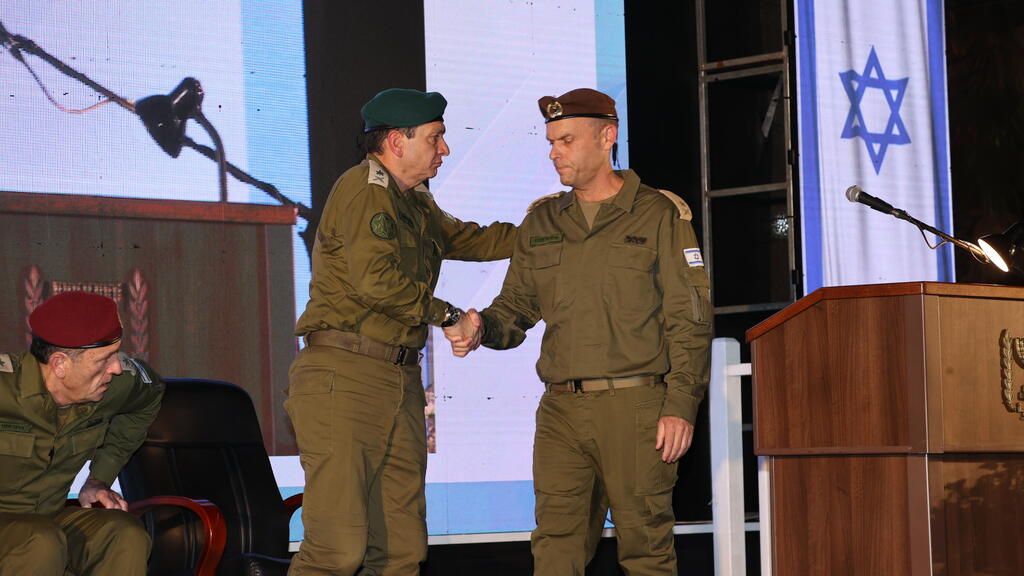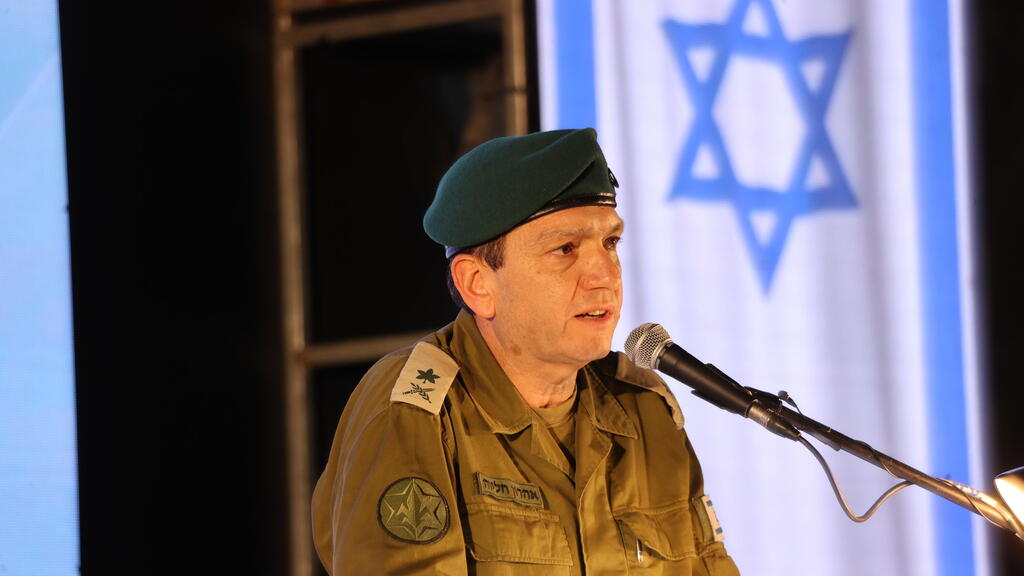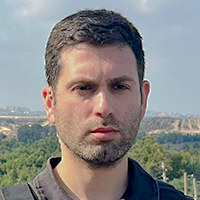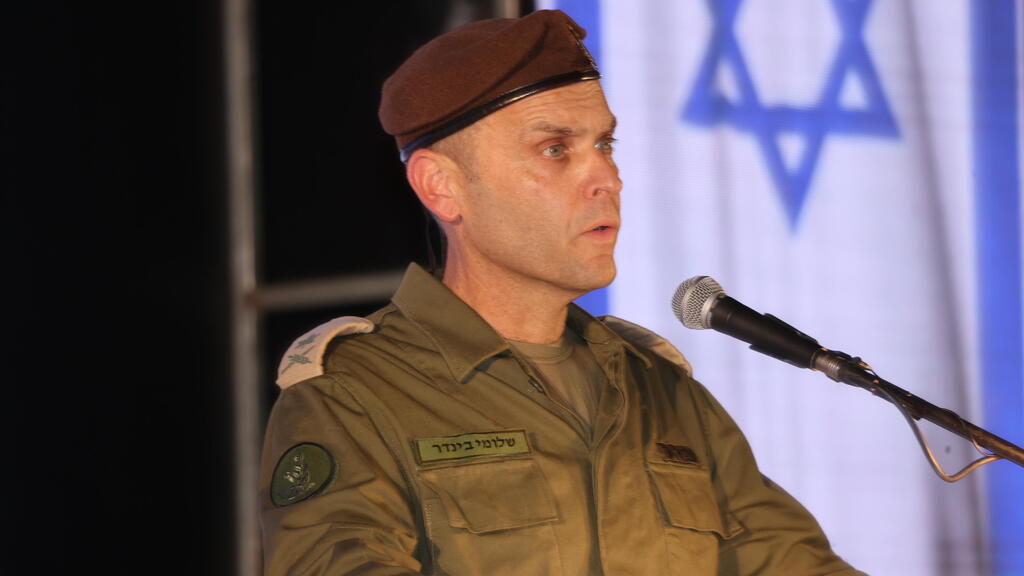Getting your Trinity Audio player ready...
The outgoing head of the Military Intelligence Directorate, Maj. Gen. Aharon Haliva, apologized on behalf of himself and the directorate for the intelligence failures that led to the Hamas massacre on October 7.
In a handover ceremony at the Glilot Base near Herzliya, Haliva delivered his first speech since October 7, saying that: "we did not live up to our holy oath. I did everything to be a loyal soldier of the IDF and the State of Israel. I was given the greatest privilege to serve the State of Israel and its citizens.On that Saturday we did not fulfill the most important mission which we are tasked with, providing a warning for war."
3 View gallery


Chief of Staff Herzi Halevi, outgoing military intel chief Aharon Haliva and his replacement Shlomi Binder at ceremony
(Photo: Yariv Katz)
"The ultimate responsibility for the failure of the Intelligence Division rests on my shoulders. The responsibility and setting a personal example is a core value of the IDF, and in leadership in general. Taking responsibility is not words, it must be actions. My decision to end my role and resign from the IDF is the norm in which I was educated is what is expected of those marching forward and those charging at the front," he said.
Haliva said that "the possibility of the expansion of the war is still on the agenda," adding: "The return of hostages and the dismantling of Hamas are the war goals we are working toward. We have been investigating in recent months at the Military Intelligence Directorate the reasons and gaps that brought us to October 7 over hundreds of hours as part of our professional duty to learn and improve. It is right to establish a state commission of inquiry to thoroughly and deeply investigate all aspects that led to war, so that what happened to us will not happen ever again - for the sake of our children and future generations."
3 View gallery


Outgoing head of the Military Intelligence Directorate, Maj. Gen. Aharon Haliva
(Photo: Yariv Katz)
Later he turned to his family, and choked on his tears: "Everything I did was for your sake. I lost many soldiers during my service, it is only by chance the bullet didn't catch me." He continued, saying: "I want to take advantage of this opportunity, and while saying goodbye to the IDF, to ask for forgiveness. In my name and in the name of the whole directorate, I ask for forgiveness."
He will be replaced by Maj. Gen. Shlomi Binder, the former commander of the IDF’s Operations Division.
"I take command of the division tonight with holy reverence. The stinging failure that led to the start of the war, and the unbearably heavy price we have paid, will forever be etched in my bones. However we must not let go and we must not give up," Binder said.
"I am asking for your trust and your commitment. The same commitment and determination that you have shown since the outbreak of the war, and which have resulted in many achievements. We are in the middle of a just, long and difficult war, which may further expand, and we will continue to preservere and meet its goals. We must dedicate our efforts to the return of the hostages in the Gaza Strip. This is a national and moral task, supreme and urgent," he said.
Regarding the threat in the north, Binder said that "we must continue to deepen our preparedness for the expansion of the war in the north, and build for Israel a good intelligence infrastructure for defense and attack in more distant arenas, as this wing has demonstrated that it knows how to do well."
IDF Chief of Staff Major General Herzi Halevi said that "the intense longing of the intelligence personnel to identify, warn and inform, and prevent murderous terrorism is the purpose of intelligence activity. And the size of the longing, so the size of the disappointment in the face of the lack of success, in the face of the failure."
"While we are carrying out the transfer of command, we do not forget those whose lives were stopped 320 days ago. Today some of the six killed hostages who were rescued in a complex operation, based on high-quality intelligence, were laid to rest. We send our condolences to the families and communities from here and share in their sorrow from the bottom of our hearts and from the depth of our responsibility. We will continue to act to return all the hostages, the living to their homes and the dead to a grave on Israel's soil."
He turned to the soldiers and people of the directorate, and said: "We will all remember the Simchat Torah of 2024 as a bitter day. We cannot change that, but we can influence the future through learning. Since October 7, in places and occasions where we present intelligence, I hear statements like 'We have seen the failure of intelligence, we can't trust it again', I have been thinking about intelligence and intelligence gathering. You must never think that you know everything."
"During your time there were many achievements, and one painful and difficult failure," Halevi said, addressing Haliva. "There are those who have not failed, and critics, because they can. They did not fail because they have never stood in a place where they carry such a heavy responsibility."
He praised Binder, and his actions on October 7, saying they included "wisdom and responsibility, integrity and self-examination."
"We chose you because the Military Intelligence Directorate always needs a very suitable commander, and today even more than ever. You are the right person for this challenging and important position for the State of Israel."
The ceremony was supposed to take place on August 1, just two days after the dramatic assassination in Beirut of Fuad Shukar, the head of the operations department in Hezbollah known as "Hajj Mohsen.". The IDF claimed responsibility for the targeted attack in Beirut, of "the commander responsible for murdering the children in Majdal Shams and killing many Israeli civilians," the IDF spokesman said at the time.
In April, General Haliva announced his resignation, after already taking responsibility for the failures of his directorate about a week and a half into the war. "The intelligence division under my command did not live up to the task we were entrusted with," he wrote at the time. "I have carried that black day with me ever since - day after day, night after night. I will forever carry with me the terrible pain of the war."
He added in his resignation letter: "I am convinced, for the sake of the State of Israel, the people of Israel and future generations, that it is right that a state commission of inquiry be established that can investigate and find out in a thorough, in-depth, comprehensive and precise manner all the factors and circumstances that led to the difficult events."



